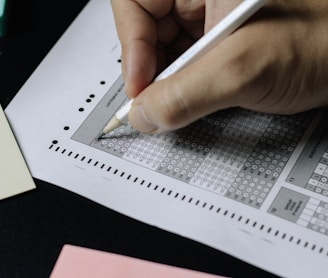3 Cycle-Mastery Method: How to always ACE your Exam
ACADEMICALL BLOGS


When exam season hits, most students think the solution is to study for hours every day until the big test. But science says otherwise: it’s not about how much you study, it’s about how you study. After years of trial and error, classroom experience, and digging into research on how the brain works, I developed the 3 Cycle-Mastery Method, a study system built around understanding, active recall, and spaced repetition. These aren’t just random tips. They’re backed by decades of cognitive science and proven to work for every type of learner.
Why Rereading Alone Fails
If you’ve ever reread all your notes the night before an exam, you’ve probably felt confident, only to forget half the material by the next week. That’s because rereading is a passive activity. Psychologists Jeffrey Karpicke and Janell Blunt found that students who used active recall, retrieving information from memory without looking at their notes, were 50% more likely to remember the material a week later compared to those who just reread.
Active recall forces your brain to work for the answer, strengthening neural connections so you can retrieve the information faster during the exam.
The Science of Spaced Repetition
Back in the 19th century, German psychologist Hermann Ebbinghaus discovered the forgetting curve, which shows how quickly we lose information when we don’t revisit it. The antidote? Spaced repetition, reviewing material at increasing intervals to lock it into long-term memory. In one large-scale study, Nicholas Cepeda and his team found that spaced repetition improved recall by 150% compared to cramming. The 3 Cycle-Mastery Method bakes this into your study schedule, making sure you revisit material often enough to keep it fresh without wasting time.
Why Multi-Sensory Learning Works
Reading a textbook and listening to a lecture is only step one. To fully master a topic, you need to engage multiple senses.
Richard Mayer, author of Multimedia Learning, explains that combining visual, auditory, and kinesthetic methods creates stronger retrieval cues for your brain. That’s why my Listen–See–Say–Write principle works so well:
Listen actively to lessons or recordings.
See concepts in diagrams, charts, or mind maps.
Say the concepts out loud to someone else.
Write them down in your own words.
This approach “hooks” the information in your brain from multiple angles, making it easier to recall when it counts.
Focused Effort Beats Endless Hours
Studying for eight hours straight sounds impressive, but it’s often a waste of time. According to Cal Newport’s Deep Work, the most productive learning happens in highly focused, distraction-free bursts, not long, half-distracted sessions.
The 3 Cycle-Mastery Method breaks your study into shorter, more intense cycles. This boosts retention, keeps you motivated, and prevents burnout.
A Smarter, Proven Way Forward
Some argue that every student learns differently, and while that’s true, research shows that certain techniques work for everyone. John Dunlosky and his colleagues found that strategies like active recall and spaced repetition improve learning across all subjects and learning styles.
That means if you follow the 3 Cycle-Mastery Method, you can reliably improve your performance, no matter what you’re studying.
Final Thoughts
If you’re tired of pulling all-nighters, feeling anxious before exams, or forgetting what you studied, it’s time to ditch last-minute cramming.
Instead, focus on:
Understanding the material deeply.
Actively recalling it without notes.
Spacing out your review sessions over time.
With the 3 Cycle-Mastery Method, you’ll walk into every exam with confidence, knowing your brain is trained, your knowledge is solid, and you’re ready to ace it.
References:
Cepeda, Nicholas J., et al. “Distributed practice in verbal recall tasks: A review and quantitative synthesis.” Psychological Bulletin.
Dunlosky, John, et al. “Improving students’ learning with effective learning techniques.” Psychological Science in the Public Interest.
Karpicke, Jeffrey D., and Janell R. Blunt. “Retrieval practice produces more learning than elaborative studying.” Science.
Mayer, Richard E. Multimedia Learning. Cambridge University Press, 2009.
Newport, Cal. Deep Work: Rules for Focused Success in a Distracted World. Grand Central Publishing, 2016.